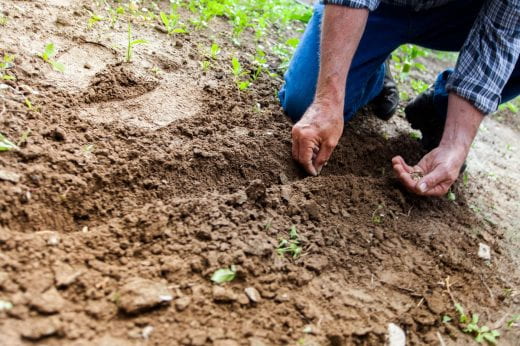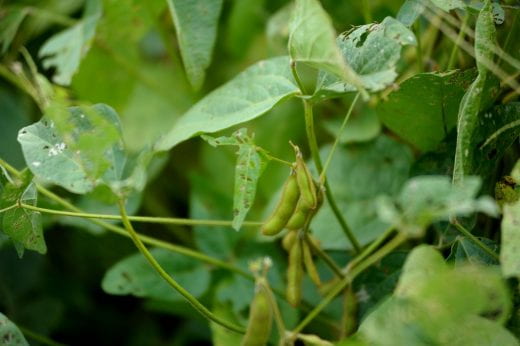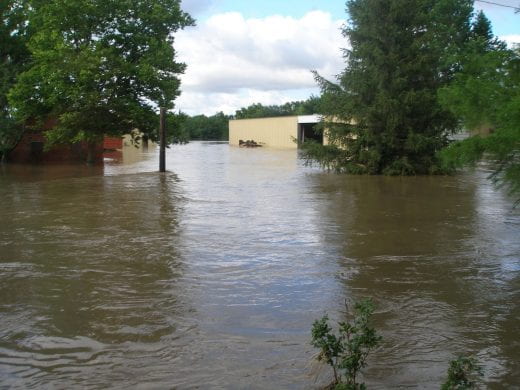This week in Better Kansas, we shed a little light on the current situation in K-State Research and Extension offices around the state, preparing for potential severe weather, being mindful of others in these unusual circumstances, planting a garden, soybean research and the CARES Act and how it affects agricultural producers. This is a small glimpse of what K-State Research and Extension across the state has to offer. Share on social media and subscribe! – Mary Lou Peter mlpeter@ksu.edu
Better Living, Better Communities
 K-STATE RESEARCH AND EXTENSION HAS AN OFFICE IN EACH OF KANSAS’ 105 COUNTIES, but like so many, most of our staff are currently working from home. You may have taken part in many extension classes, field days and other programs or maybe you’re just discovering us! We’re still here and still in the education business but the ways we convey the information will continue to look a little different than our typical in-person events, at least through July 4. Read more about it. And check with your local extension office to see what’s being offered and what’s coming up.
K-STATE RESEARCH AND EXTENSION HAS AN OFFICE IN EACH OF KANSAS’ 105 COUNTIES, but like so many, most of our staff are currently working from home. You may have taken part in many extension classes, field days and other programs or maybe you’re just discovering us! We’re still here and still in the education business but the ways we convey the information will continue to look a little different than our typical in-person events, at least through July 4. Read more about it. And check with your local extension office to see what’s being offered and what’s coming up.
THE RECENT DEADLY STORMS ACROSS THE SOUTHEAST U.S. ARE just the latest reminder that we’ve entered the time of year when severe weather is more likely. And this year, in the midst of the pandemic, we have even more to consider. If you haven’t done it yet, or are not sure where it is, put together an emergency kit AND make a plan with your family. I’m always reminded how once in a meeting with all age groups represented, in case of an emergency, the older participants said they’d take photo albums and the younger ones said they’d grab their computers. I think we’d all be grabbing our cell phones, but let’s have our emergency kits ready, too! Good resources include Severe weather preparedness during COVID-19; the Prepare Kansas blog; Ready.gov; and Kansas Division of Emergency Management.
 EVEN THOUGH THIS IS THE BETTER LIVING, BETTER COMMUNITIES SECTION, I’m including a link to something I read this week in the Animal Sciences and Industry newsletter that I thought we could all use a reminder about. It’s the message in “Management Minute: Circumstances and Assumptions” at the top of the third page that resonated with me. It has to do with how, like we ourselves are dealing with a weird reality right now, sometimes fraught with stress and anxiety, so is almost everyone around us. So, when we’re frazzled because of our own situation, try to remember that almost everyone you’re interacting with probably is, too. This came home to me this week when I was on the phone with someone from my cable company, trying to get my ever-climbing monthly bill reduced. The woman on the other end sounded less than professional and like she was, ummmmm working from home, which I realized she probably was! Hang in there everyone.
EVEN THOUGH THIS IS THE BETTER LIVING, BETTER COMMUNITIES SECTION, I’m including a link to something I read this week in the Animal Sciences and Industry newsletter that I thought we could all use a reminder about. It’s the message in “Management Minute: Circumstances and Assumptions” at the top of the third page that resonated with me. It has to do with how, like we ourselves are dealing with a weird reality right now, sometimes fraught with stress and anxiety, so is almost everyone around us. So, when we’re frazzled because of our own situation, try to remember that almost everyone you’re interacting with probably is, too. This came home to me this week when I was on the phone with someone from my cable company, trying to get my ever-climbing monthly bill reduced. The woman on the other end sounded less than professional and like she was, ummmmm working from home, which I realized she probably was! Hang in there everyone.
Better Farming, Ranching and Gardening
 ALL OF THIS TIME AT HOME IN THE MOST UNEXPECTED OF CIRCUMSTANCES HAS MANY OF US EAGER TO GET OUT THERE AND PLANT A GARDEN. Check out this video for basic tips, including not going overboard on the number of plants (guilty) and planting the garden where it gets enough sun. Plus, don’t forget to check the ever-popular Kansas Garden Guide for information on growing all kinds of fruits and vegetables, including the occasional challenge like pest control. There’s even a section on alternatives to chemicals. It also covers fertilizing, tips on efficient water use and a chart showing what zone you’re in. Pretty sure some people think I’m in the twilight zone, but that’s a topic for another day. These zones have to do with average frost-free days when it’s safest to plant. I’m reminded again just how big our state is.
ALL OF THIS TIME AT HOME IN THE MOST UNEXPECTED OF CIRCUMSTANCES HAS MANY OF US EAGER TO GET OUT THERE AND PLANT A GARDEN. Check out this video for basic tips, including not going overboard on the number of plants (guilty) and planting the garden where it gets enough sun. Plus, don’t forget to check the ever-popular Kansas Garden Guide for information on growing all kinds of fruits and vegetables, including the occasional challenge like pest control. There’s even a section on alternatives to chemicals. It also covers fertilizing, tips on efficient water use and a chart showing what zone you’re in. Pretty sure some people think I’m in the twilight zone, but that’s a topic for another day. These zones have to do with average frost-free days when it’s safest to plant. I’m reminded again just how big our state is.
 SOYBEANS ARE: A) OFTEN FOUND IN LIVESTOCK RATIONS; B) A COMMON INGREDIENT IN AMERICAN’S COOKING OIL; OR C) A SNACK CALLED EDAMAME. ANSWER: ALL OF THE ABOVE! They’re even grown to be used in biodiesel fuels. A K-State researcher is leading a team of scientists from several states looking for ways to improve the quality of soybean seeds so that the crop maintains high protein levels even as yields per acre increase. A short online article hits the highlights. TOFU ANYONE?
SOYBEANS ARE: A) OFTEN FOUND IN LIVESTOCK RATIONS; B) A COMMON INGREDIENT IN AMERICAN’S COOKING OIL; OR C) A SNACK CALLED EDAMAME. ANSWER: ALL OF THE ABOVE! They’re even grown to be used in biodiesel fuels. A K-State researcher is leading a team of scientists from several states looking for ways to improve the quality of soybean seeds so that the crop maintains high protein levels even as yields per acre increase. A short online article hits the highlights. TOFU ANYONE?
 WHAT IS ‘CARES’ AND WHY SHOULD WE CARE? Because in one way or another, we’ve all been affected by COVID-19. Just last weekend I learned that the father of a high school classmate died of the virus. And we all know people who are at least temporarily out of work or whose business is suffering or worse. The Coronavirus Aid, Relief and Economic Security Act or CARES Act was signed into law March 27 with bipartisan support in response to the COVID-19 pandemic. The more than $2 trillion relief package has financial provisions to help many Americans, including agricultural producers. Of the total, $9.5 billion will go for direct relief to livestock, dairy and specialty crop producers. For much more on how the CARES Act will work for farmers, ranchers and agricultural cooperatives, take a look at Government Stimulus Programs for Ag Producers and Coops which includes a link to a fact sheet and recently recorded webinar on the topic.
WHAT IS ‘CARES’ AND WHY SHOULD WE CARE? Because in one way or another, we’ve all been affected by COVID-19. Just last weekend I learned that the father of a high school classmate died of the virus. And we all know people who are at least temporarily out of work or whose business is suffering or worse. The Coronavirus Aid, Relief and Economic Security Act or CARES Act was signed into law March 27 with bipartisan support in response to the COVID-19 pandemic. The more than $2 trillion relief package has financial provisions to help many Americans, including agricultural producers. Of the total, $9.5 billion will go for direct relief to livestock, dairy and specialty crop producers. For much more on how the CARES Act will work for farmers, ranchers and agricultural cooperatives, take a look at Government Stimulus Programs for Ag Producers and Coops which includes a link to a fact sheet and recently recorded webinar on the topic.
Kansas Corn hosted a webinar that may be helpful as well.
_
For more resources and activities, contact the K-State Research and Extension office in your area. Check out our other blogs and subscribe to our weekly emails here: https://www.ksre.k-state.edu/news/blogs/


